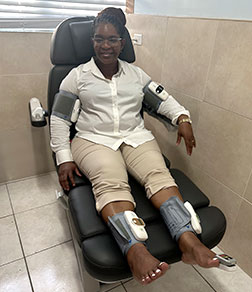What Is Smart ABI?
The Smart ABI (Ankle Brachial Index) test helps our podiatrists compare the blood pressure in the ankle with the blood pressure in the arm. A low ABI can detect a blockage or narrowing of the arteries in the legs, which may indicate peripheral arterial disease (PAD). The Smart ABI test is non-invasive, painless, and fast. It provides an easy-to-read, color-coded report that indicates whether the patient has a normal, borderline, or severe risk factor for PAD. This advanced test saves patient data, which helps our podiatrists track patient progress throughout treatment.

Early Detection of PAD
Uncover potential risks of Peripheral Arterial Disease (PAD) with our cutting-edge Smart ABI technology. Family Foot Centre is dedicated to your foot health, and we're proud to offer this revolutionary diagnostic tool to our patients. Peripheral Arterial Disease can often go unnoticed, leading to serious complications. Our Smart ABI test is non-invasive and painless, assessing blood flow in your legs to identify any signs of reduced circulation.
If you're experiencing leg pain, cramping, or suspect PAD, don't wait. Request an appointment today by calling Office: (242) 341-3668 or Mobile: (242) 802-3668.
Peripheral Artery Disease (PAD) is a disease in which the patient has reduced blood flow in the arms or legs (usually the legs) and is often caused by a buildup of fatty deposits in the arteries (atherosclerosis).
Peripheral Autonomic Neuropathy is a disease in which the patient has damage to the nerves that control automatic bodily functions on the periphery. This nerve damage affects the messages sent between the brain and the autonomic nervous system in the hands and feet and can affect the sweat glands and blood vessels.
Peripheral Artery Disease Risk Factors
- Diabetes
- Smoking (cigarette)
- 50+
- High Blood Pressure
- High Cholesterol
- Obesity
- Family History
